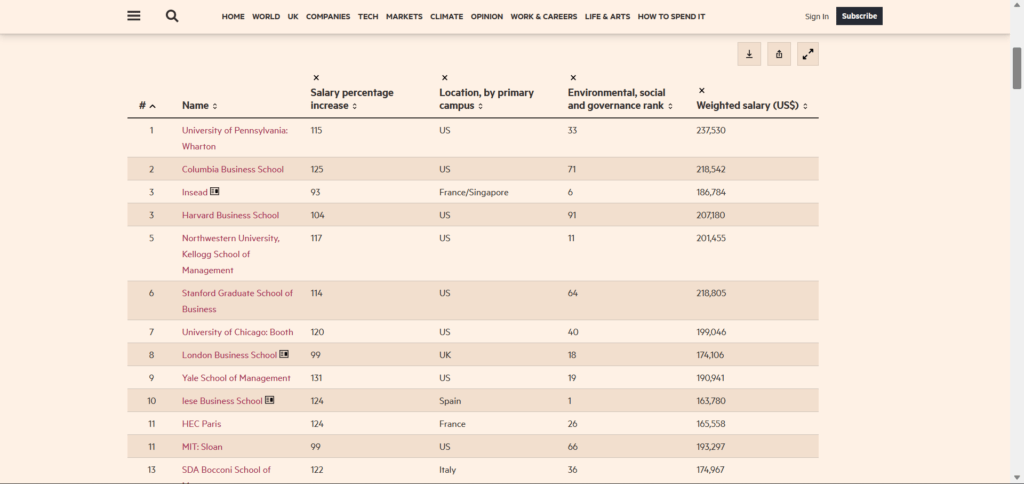UPDATE: This article was originally posted on June 13, 2018. It has been updated with new information and tips below.
What’s the difference between a $100k car and a $100k MBA? If you don’t like the car, you can sell it and buy a different one. An MBA stays with you for life.
Considering the fact that you can only do one MBA, choosing where to apply is the most important decision you will make during your application process.
Though there are many components to a successful business school application, it’s important to know what you want out of your MBA before you ever write a word of your first admissions essay.
That’s why in this post, we’re sharing the 7 most important factors you must consider when deciding where to apply to business school. We cover everything from duration to culture to alumni networks to ensure you have all the information you need to choose the best programs to reach your personal and professional goals.
1. Location
As the real estate mantra goes: location, location, location.
Though the world is increasingly global, where you do your MBA inherently still largely influences which opportunities you will have access to.
For example, let’s imagine you want to break into Private Equity and decide to go to Berkeley Haas. Though Berkeley Haas is a phenomenal MBA program, the headquarters of the firms most MBAs are dying to work for are a 6-hour flight away in New York City.
This doesn’t mean you can’t participate in New York-based recruiting and events. It just means you’re going to have to do a lot more planning ahead.
Another key issue is considering the country in which the program is located.
If you are keen to try to land a job in the US, it’s important to apply to US-based schools. This not only allows you a no-strings-attached one-year work visa through the OPT program, but it also makes it a lot easier for you to network with companies who are willing to sponsor your visa after your OPT runs out. If you’re planning to use the OPT program, you will want to make sure to keep an eye on the news, as there have been talks to eliminate the program. However, as of now, no definitive action to do so has been taken.
For international students looking to relocate abroad, Canadian business schools also offer an interesting alternative to US-based schools. The Canadian government allows graduate school graduates to immediately work in any field or industry in Canada for 3 years after finishing their degrees. This can then be transformed later into Permanent Residency status.
Many of our clients also actively pursue opportunities in Europe.
For example, our client Marina knew she wanted to spend more than two years abroad, but wanted to relocate to a safer country with a better work/life balance than her home country in order to jump-start her career and start a family.
With this in mind, her Italian passport proved the key to our application strategy. We focused on European schools with top recruiting opportunities (namely, INSEAD, IESE, and London Business School). After successfully graduating from INSEAD, Marina used her fluent Spanish to land a job at Amazon in Barcelona.
Though having a European passport certainly helps when considering shifting careers to Europe, policies there are still generally more favorable towards visa-seeking students than those in the US. As such, applying to European MBAs may prove a great strategy to help you reach all of your career goals.
There’s no one “ideal” place to obtain your MBA, but the location will ultimately play a role in your future. As such, it’s important to reflect on how this critical factor influences your MBA journey.
2. Program length
Since 1-year MBAs were first introduced more than 50 years ago, the debate over whether a 1-year MBA is better or worse than a 2-year MBA has raged.
 The answer to the age-old question?
The answer to the age-old question?
It depends on your profile, goals, and expectations for your MBA experience.
Age and seniority
One of the most important benefits of an MBA is that it gives you leverage to earn a higher salary and land a more senior position.
However, as your career advances, promotions are less frequent. This is due to the simple fact that most organizations have few people at the top calling the shots, meaning it may take years for you to nab an open C-Level position.
As such, if you are on the older or more senior side of the applicant pool (around 30 and up), a 1-year program might be a better option for you.
Though there is no definitive cut-off date, if you have more than 6 years of work experience, you may want to give a 1-year program serious consideration.
Industry and career shifts
In the modern world, business moves quickly. But some businesses move more quickly than others.
Considering the ramifications of an extended “leave of absence” from the market is an important factor, especially for professionals in the technology industry. Need proof? Try to remember which version of the iPhone you were using two years ago!
Perhaps for this reason one of the fastest-growing segments of the 1-year MBA segment is targeted toward tech talents. Thus, a 1-year program might be the perfect option for you if you’re focused on this fast-growing sector.
This same logic applies to other quickly growing industries like fintech and challenger banking.
On the other hand, for career-switchers, a 1-year MBA may represent a significant disadvantage, as it does not usually allow students to complete a summer internship.
For professionals aiming to use business school to rebrand or break into a new segment, having the chance to prove you’ve got what it takes (and having the help of a highly trained MBA career center to ensure you land highly-coveted interviews) can be the key to successfully reaching this goal.
ROI
Another key factor to consider is the cost of a 2-year program versus the cost of a 1-year program — and the salary boosts associated with each.
When looking purely from a cost standpoint, 2-year programs are plainly more expensive, especially after factoring in two years of cost of living and lost wages.
Tuition is also higher. For example, tuition at INSEAD, one of the world’s most popular 1-year MBAs, will set you back around $105,000. Meanwhile, Harvard Business School’s tuition will set you back nearly $150,000 after two years.
However, costs alone don’t tell the whole story, since an MBA is a chance to maximize your skill and knowledge development.
As a 2-year MBA graduate, you will certainly gain more knowledge, experience, and networking power than a 1-year candidate. Thus, salary may not be the most important priority based on your objectives.
Either way, it is important to consider what makes more of an impact on you. Will taking on more debt stifle your post-MBA dream of becoming an entrepreneur? Or do you need a lot of intensive training in order to make your career goals come true? Only you can answer that!
3. Instruction style
Have you considered how your learning style might impact your MBA experience?
Though this may seem like a non-issue, considering how you learn best and which teaching styles your target schools employ is of critical importance.
In general, there are three primary teaching styles: case studies, lectures, and experiential learning.
Case studies
One of the most famous schools to use this method is Harvard Business School. The case study method relies on providing students with real or simulated business cases, which they must analyze and openly debate in class.
This method requires extensive out-of-class preparation and a willingness to speak frequently in front of large groups of your peers. Though introverts can certainly thrive at case-based MBAs, you should consider if you want to spend two years immersed in this type of environment.
Lectures
Lecture-based learning is the style we most often think of when picturing an MBA classroom.
The schools that rely heavily upon this method, like UCLA Anderson and CMU Tepper, believe this approach is one of the most effective ways to transmit knowledge and key concepts to students, ensuring they can take what they learn and apply it in their jobs later on.
Schools that employ this approach may be a good fit for you if you prefer a more traditional pedagogical style.
Experiential learning
The experiential approach has become increasingly popular in recent years, as it focuses on encouraging students to learn by doing. Though there are many iterations of this type of program, one of the most famous is Michigan Ross’ Multidisciplinary Action Projects, during which students spend 7 weeks working inside a company to solve the organization’s real challenges.
Another unique experiential learning program is Haas@Work, part of the Berkeley Haas curriculum. Through this program, students are allocated to work directly in major firms (think Cisco, Visa, Disney), giving you the opportunity to tackle real-world challenges head-on.
If you’re looking to test the waters in a new segment or industry or find you learn the most when getting your hands dirty, schools with this approach might be best for you!
There is no universally “optimal” way to teach an MBA. Instead, when considering which program style is best for you, make sure to deeply reflect on how you prefer to learn and which educational experiences have been the richest for you in the past.
4. Brand/Ranking
We often advise our clients to attend the highest-ranked business school they are admitted into, as more prestigious schools often offer greater career benefits than lower-ranked MBAs.

Source: The Financial Times’ 2022 Global MBA Ranking
Furthermore, many sponsorship programs are limited to top-ranked schools.
As such, it’s important to consider if you are attending an MBA simply for the experience, or if you need to leverage your business school experience into a promotion or pay increase.
TOP TIP: Rankings can vary greatly from one website to another, as they tend to use different metrics to calculate their winners. Learn more about exactly why rankings differ here!
On the other hand, it’s good to test-drive certain school brands in the industry and region you intend to pursue after the MBA.
For example, one of our former clients, Andre, needed to make a tough choice between offers from Yale SOM and Northwestern Kellogg. He was certain he wanted to return to the company he worked for (a Latin American investment bank) and was relatively close with the company’s CEO and Chairman of the Board. One day over lunch, he laid his options on the table and asked for advice.
The results shocked him.
Though Kellogg ranks higher than Yale in most rankings, these two very influential people in Andre’s company (and career plans) were much more impressed with Yale’s ivy league reputation and strongly encouraged him to attend the school. As these would be the people who were ultimately responsible for his future promotions, he decided to attend Yale.
This kind of disparity may not translate to your industry or region, but it is a good idea to understand how strong a school’s brand is with the people who matter in your future.
5. Alumni network in your region

Another key reason to pursue an MBA is to expand your network, and the power of a well-connected network is not to be underestimated.
Unfortunately, not all alumni networks are created equal. Some are much more active, hosting regular dinners and events, and others are less than robust.
Considering the alumni network you build during your MBA will put you in touch with potential employers and/or business partners, the strength of a school’s network will ultimately influence your career.
It’s also important to note that networks vary greatly by region.
Simply put, there often aren’t enough alumni from a given school in your region to sustain an active network. So, speak with students, check out the schools on LinkedIn, and ask about the alumni network during info sessions you attend.
6. Campus culture

Photo courtesy of bloomberg.com
Each business school offers a unique community whose individual characteristics often vary greatly. For example, Wharton’s culture is known for valuing analytical, precise personalities that are driven to become business leaders. On the other hand, Darden’s community prides itself on its grit and ability to take on immense challenges.
For that reason, it’s important to consider what kind of environment is best for you.
Do you thrive under pressure, making Darden an excellent option for you? Or is a collaborative, friendly community more your style? If so, Kellogg’s culture of social impact and changing the status quo might be your dream MBA program.
Visiting the schools is one of the best ways to get a sense of a school’s culture and ultimately determine if it’s somewhere you fit in. If, due to COVID-19, you are unable to travel to the schools, make sure to participate in the numerous online info sessions taking place. Though it’s not quite the same thing as an in-person visit, it’s a great way to learn more about the schools’ programs and cultures.
7. Majors and specializations
Though all MBAs offer you the chance to improve your business administration skills, if you’re particularly focused on one particular area, you may find some schools are more able to meet your needs than others.

For example, if you want to break into fintech, you might think all schools with strong finance programs would allow you to build the specialized skills you seek. However, this isn’t the case. Instead, you may want to look at the small handful of MBAs who have developed programs or tracks specifically focused on fintech, such as NYU Stern or Cornell Johnson.
Furthermore, as interest in tech and social impact careers increases, schools are expanding their programs to better meet student needs. Be careful, however, as not all MBA specializations are created equal. Though many schools offer social impact programs, for example, some are highly focused on environmental sustainability, which may not be aligned with the type of social impact you want to explore during business school.
As such, devote some time to exploring the different majors and elective courses your potential target schools offer to ensure you can make the most of your MBA to reach your career goals.
8. Find your application ally
During the MBA application process, you will need to make thousands of decisions that will impact your life for decades to come.
One of the most important decisions is where you choose to apply.
Though you may be tempted just to work your way down the rankings, having a trusted ally who can use their deep knowledge of your profile and what different business schools offer can be the difference between loving your MBA program and wishing you’d done everything differently.
As we believe in the importance of understanding each of our client’s needs, objectives, and situations, we pride ourselves on delivering both satisfaction and success to those we work with. We find this method helps our clients not only get into their dream programs but also take greater advantage of their MBAs.
Working with us can add more value than you ever thought possible to your MBA application. To take advantage of the Ellin Lolis Advantage, sign up to work with us today!
Real MBA Essays That Got People In
School-specific sample essays that got our clients accepted






